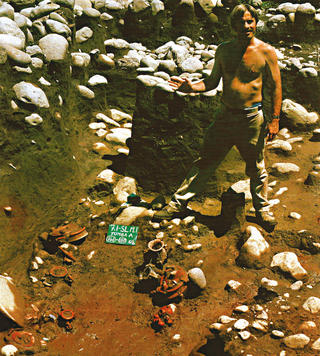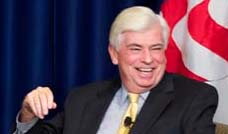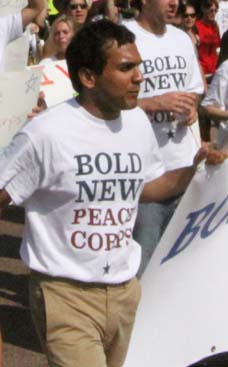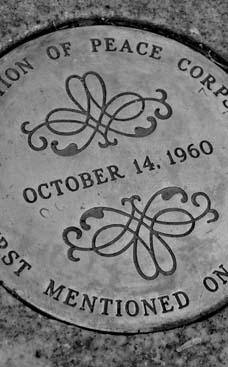
Snarskis grew up in Iowa, attending high school in Cedar Rapids. He received a scholarship to Yale University, the Ivy League college in New Haven, Connecticut, where he studied Spanish literature. He graduated a member of the class of 1967, and soon joined the Peace Corps. From those artifacts he pocketed (and later returned) in Costa Rica, Snarskis discovered he wanted to be an archeologist. Snarskis returned to Costa Rica in the mid-1970s to work on his dissertation. He convinced the director of the National Museum to let him help start an archeology department. By 1976, Snarskis had four students from the University of Costa Rica (UCR) working under him, and the team revolutionized archeology in the region. Learning from his own past mistakes, Snarskis ensured that every item was put in proper context before being removed from the site. The data he recorded on artifacts was extensive. Instead of just doing digs, Snarskis excavated foundations of houses, ancient plazas and pathways. He turned archeology in the country from something that was confined and tedious into an expansive art. "I considered him a jazz archeologist," said Ricardo Vázquez, one of Snarskis' original students and the current director of archeology at the National Museum. "He played very much by intuition. And he had a great intuition in many of his findings."
RPCV Michael Snarskis discovered ancient civilizations in Costa Rica
Archaeologist Michael Snarskis, who discovered ancient civilizations in Costa Rica, dies at 65
Posted: Friday, February 04, 2011 -
By Matt Levin
Snarskis founded the archeology department at Costa Rica's National Museum, and excavated sites that dated as far back as 9000 B.C.
Michael Snarskis first spent time in Costa Rica as a member of the Peace Corps. While here he began to think of himself as an amateur archeologist, collecting trinkets and heirlooms in the area in where his group was assigned. When Snarskis applied to study for a doctorate in archaeology at Columbia University, he boasted in his application about his collection of Costa Rican artifacts. Only later would he realize that his mini-excavations during his time in the Peace Corps were – by archeology standards – more on par with looting.
"I still don't know how they accepted me," Snarskis joked to friends afterwards about his acceptance in Columbia.
But he more than made up for his indiscretion when he returned Costa Rica. For four decades, Snarskis' contributions were some of the most significant archeological discoveries in Costa Rica's history.
Snarskis, who led the way for efficient, meticulously-recorded archeology in the country, died Jan. 24. He was 65.
Snarskis grew up in Iowa, attending high school in Cedar Rapids. He received a scholarship to Yale University, the Ivy League college in New Haven, Connecticut, where he studied Spanish literature. He graduated a member of the class of 1967, and soon joined the Peace Corps. From those artifacts he pocketed (and later returned) in Costa Rica, Snarskis discovered he wanted to be an archeologist.
Snarskis returned to Costa Rica in the mid-1970s to work on his dissertation. He convinced the director of the National Museum to let him help start an archeology department. By 1976, Snarskis had four students from the University of Costa Rica (UCR) working under him, and the team revolutionized archeology in the region.
Learning from his own past mistakes, Snarskis ensured that every item was put in proper context before being removed from the site. The data he recorded on artifacts was extensive. Instead of just doing digs, Snarskis excavated foundations of houses, ancient plazas and pathways. He turned archeology in the country from something that was confined and tedious into an expansive art.
"I considered him a jazz archeologist," said Ricardo Vázquez, one of Snarskis' original students and the current director of archeology at the National Museum. "He played very much by intuition. And he had a great intuition in many of his findings."
Most of his excavations took place in the Central Highlands or in the Caribbean coastal region. One of his best-known discoveries was a site in Turrialba called Guardiria, which he excavated in 1975. Many believe Guardiria was the first area of human occupation in Costa Rica, with artifacts dating back to 9000 B.C. Other discoveries and excavations included the 2000-year-old settlement of Loma Corral, Severo Ledesma near Guacimo and Chaparrón in Turrialba. He admired intricate ceramics and precious jade artifacts. Some of the artifacts he catalogued toured the world in acclaimed exhibits.
Silvia Salgado, another one of the four original students to work with Snarskis, doesn't remember him as particularly excitable when he made his discoveries. Instead the discussions about the findings were what most revealed Snarskis' love for his career.
"There weren't many things that you could talk to him about that could engage him in a conversation, [but] one of them [that could] was archeology," said Salgado, an archeology professor at the UCR. "And you could talk to him for months and years, non-stop about archeology."
Snarskis' other love was art, Salgado said. He married a Costa Rican artist named Rosa Alvarado, although they divorced 13 years ago.
After leaving the National Museum, Snarskis worked various jobs for agricultural agencies and other jobs away from the field of archeology. Still, he taught archeology classes at the UCR and offered tours of his favorite sites. He also wrote an archeology column for The Tico Times.
Health problems prevented him from returning to newly excavated sites in recent years. Instead, Snarskis gave tours as a way to teach others about the region's history.
Maggie Koerth-Baker, a journalist who studied anthropology at the University of Kansas with a colleague of Snarskis, took a tour with Snarskis in January of last year. Koerth-Baker, her husband and Snarskis visited the pre-Columbian area of Guayobo in Cartago. Snarskis' enthusiasm lasted the entire day. He talked all about archeology not just at the site, but also in the car ride up and back, and during lunch.
"He conveyed information by storytelling," Koerth-Baker said. "It's not just: ‘Here's a fact.'"
A narrative about the founding of Guayobo ran throughout their entire tour, she said. Koerth-Baker wrote a story about her vacation in Costa Rica, and while researching what tour guides told her she discovered that many of the guides seemed to be inventing facts. But every Snarskis fact checked out. His stories needed no embellishment.
A funeral, coordinated by his former wife, will take place this weekend at the Guardiria archeological site. At Guardiria, Snarskis' ashes will be scattered on the dirt where he discovered civilizations that had risen and returned to the soil thousands of years ago.
He is survived by his mother, Alice, and his brother John.















